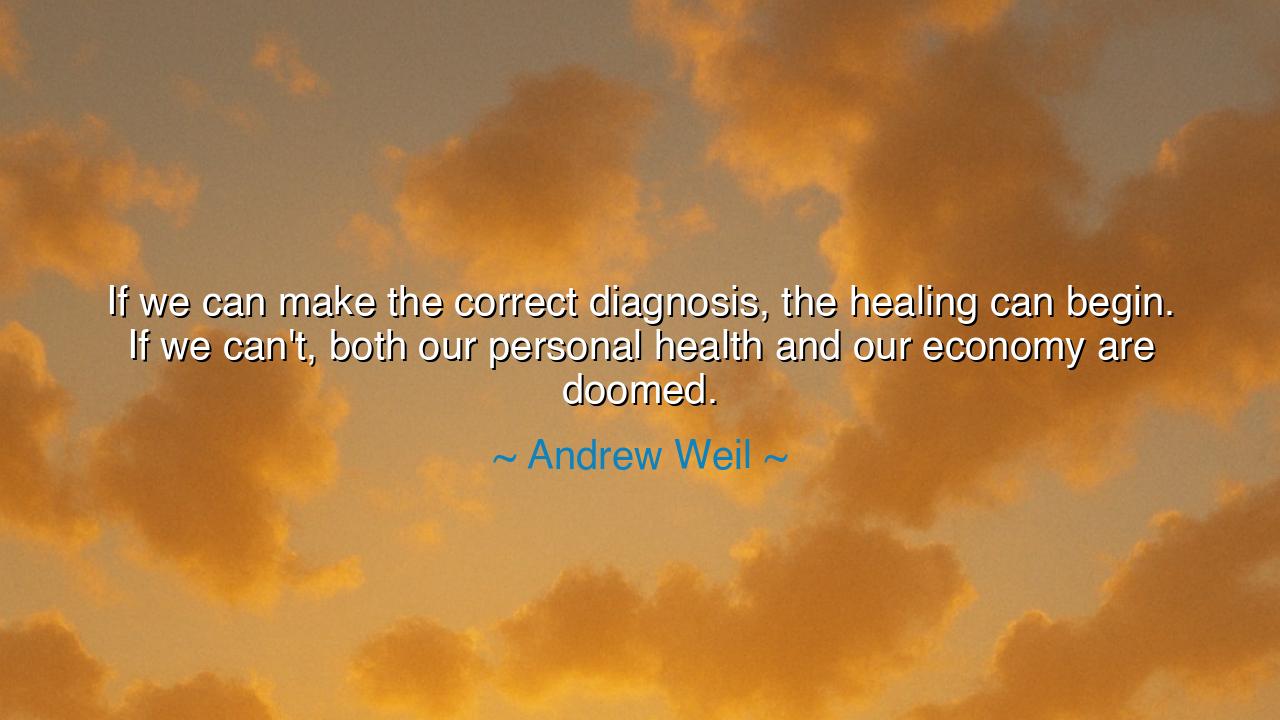
If we can make the correct diagnosis, the healing can begin. If
If we can make the correct diagnosis, the healing can begin. If we can't, both our personal health and our economy are doomed.






“If we can make the correct diagnosis, the healing can begin. If we can't, both our personal health and our economy are doomed.” — thus spoke Andrew Weil, the physician-sage who wove the wisdom of ancient healing with the science of modern medicine. His words, though addressed to the ills of the body and the sickness of society, echo with universal truth: that understanding precedes restoration, and that no cure — whether for man or for civilization — can begin without truthful recognition of what has gone wrong. To deny the wound is to feed it; to name it rightly is to reclaim the power to heal.
Weil’s saying draws from the very heart of medicine, where diagnosis is the sacred art of seeing. The healer’s first task is not to cut, nor to medicate, but to perceive — to look deeply into the signs and symptoms until the hidden cause is revealed. This act requires not only science, but wisdom and humility. For as the ancients said, “The disease unknown is the disease unconquered.” If one treats only the fever and not the infection, only the pain and not the cause, the illness will return again and again, deeper and more cunning. And what is true of the body is also true of nations, of communities, and of the human spirit.
Consider the story of the Black Death that swept across medieval Europe. For years, physicians blamed the stars, the air, or divine wrath — misdiagnosing both cause and cure. It was only when the nature of the infection itself was understood — when knowledge replaced superstition — that humanity could begin to contain its terror. The plague, in its horror, taught a timeless lesson: when the diagnosis is false, remedies become poison. Whole societies can perish not from the disease itself, but from ignorance and denial. Thus, Weil warns, if we fail to see our afflictions clearly — whether in body or in economy — our very foundations may collapse beneath the weight of misunderstanding.
In his words, we also hear a metaphor for the disease of modern civilization. When he speaks of the “economy,” he does not mean merely coins and commerce, but the vast system by which humanity sustains itself — the exchange of energy, labor, and life. If a nation suffers from inequality, pollution, or greed, these are not random misfortunes but symptoms of a deeper malaise. To restore balance, one must first diagnose the root illness — whether it lies in corruption, overconsumption, or the estrangement of the human spirit from nature. The doctor of the body and the healer of society share the same task: to see clearly, to name rightly, and to act wisely.
So too in our personal lives, the principle holds. Many walk through their days in quiet sickness — anxious, weary, unfulfilled — yet refuse to look inward to find the cause. They medicate the pain with distraction, drown the silence with noise, and call it healing. But true healing begins only when one has the courage to face the mirror of the self. To say, “This is where I am wounded,” is the first and hardest step toward wholeness. For as Weil teaches, no medicine can help the man who denies his illness, and no economy can thrive when its moral bloodstream is clogged with greed and neglect.
There is a deeper wisdom here: the diagnosis itself is a form of light. It turns the unknown into the known, the invisible into the visible. It transforms fear into understanding, and in understanding, hope is born. This is why ancient healers — from Hippocrates to Ayurvedic masters — viewed the process of healing as both spiritual and physical. The same principle guided leaders who rebuilt nations after crisis: they named their errors, faced their failures, and only then began to rebuild. The act of naming — of truth-telling — is the beginning of all redemption.
The lesson, then, is simple yet profound: do not fear to look directly at what is broken — in your body, in your community, in your world. Seek truth before remedy, understanding before action. When something ails you, ask not only “How can I stop the pain?” but “Why has this pain come?” In every problem lies a message, and in every diagnosis, a map to transformation. Whether you are a healer of bodies, a leader of people, or a seeker of peace, remember that clarity precedes healing, and that denial is the surest path to destruction.
So, children of wisdom, take this teaching into your hearts: when the wound is seen, it begins to close; when the truth is spoken, the world begins to mend. Make the correct diagnosis — in yourself and in your society — and let that insight be the first medicine. For only by seeing what truly is can we build what truly ought to be. And in that act of courageous seeing, both the body and the world may yet be healed.






AAdministratorAdministrator
Welcome, honored guests. Please leave a comment, we will respond soon